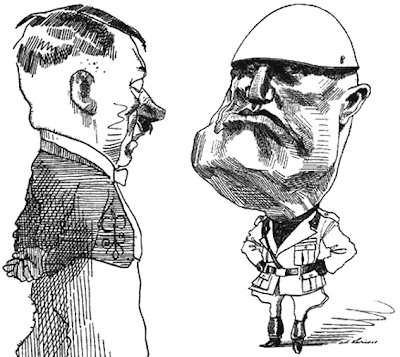Am I imagining it or is fascism slowly becoming respectable again? China's a fascist country in some respects, and in my more paranoid moments I wonder if its success is prompting some people to wonder if we should follow them down the same path. It's a creepy thought.
If you ask college students who their favorite philosopher is, the chances are that they'll say Nietzche. Yes Nietzche, the same guy who believes in the world-changing superman whose morality transcends notions of good and evil. What's with that?
And the news is full of troubling ideas. The latest one for me was a high-ranking official in Britain saying that new discoveries in economics have proved that economic crises are caused by erroneous ideas held by the public, and that the government needs to launch a propaganda campaign to instill the right ideas. There's a sense in which that idea is innocuous and completely innocent, but in my paranoid moments I imagine Josef Goebbels saying the same thing.
Okay, I admit I'm probably too sensitive about this stuff. I'm a classical Enlightenment-era liberal. I believe in parliaments, individual rights, checks and balances, a free press, tolerance of opposing views, private property, competitive business, and all that. Every once in a while I like to be reassured that we're all more or less on the same page in that respect.
A philosopher you hear more and more about these days is Carl Schmitt, an unrepentant Nazi legal philosopher who believed that any effective government must include an element of dictatorial power within its constitution. It must be able to assert that something is right, just because it is, and is beyond rational argument. He hints that people who insist on arguing the issue anyway, must be isolated and made to appear anti-social.
I'm amazed that an intelligent guy like Schmitt could buy into an idea which is so clearly open to abuse, but Schmitt was a legal scholar and those guys have a narrow focus. They don't like messy things like English common law, with its emphasis on precedent and tradition. They're looking for fundamental principals. A simplifying assumption that a party or a leader can do no wrong (as long as they don't change their minds), allows them to construct a logically consistent set of laws, and I guess consistency is all they really care about.
What sets Schmitt apart from other Nazi theoreticians that I've heard about, is that Schmitt frames his ideas in a sugar-coated language that modern academics can relate to. His most famous book, "The Concept of the Political" never mentions fascism. He simply asks if we desire to keep alive the concept of politics, i.e., a state that has a political point of view, is effective, and gets things done. Well, everybody wants to see things get done. When you frame it in a nice way like that, Schmitt's ideas seem downright reasonable. Except they're not.
Okay, enough of this! That's the end of my paranoid rant!
BTW: how do you like these WWII era posters? The black and white picture on the top is an ink wash, isn't it? I'm astonished at what can be accomplished with ink and a little bit of water.









